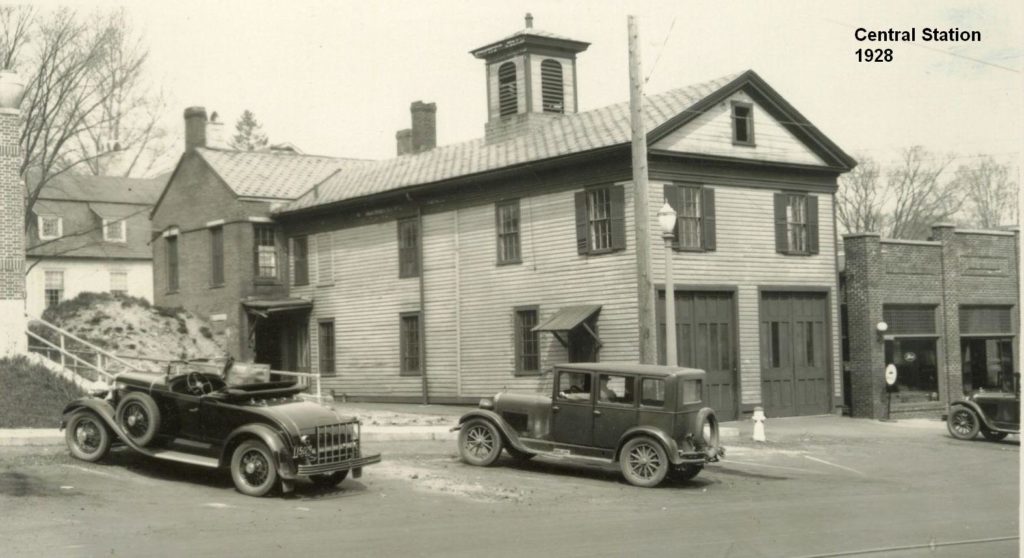OPINION: IS THE HISTORICAL COMMISSION OVERSTEPPING ITS CHARGE?

Amherst Central Fire Station 1928. Photo: amherstma.gov

Well into the June 15 marathon Town Council Meeting, the Council turned to the usual pro forma approval of Town Manager appointments, when Councilor Mandi Jo Hanneke (at large) said she would abstain because of the nominees for reappointment to the Historical Commission, Jan Marquardt and Hetty Startup.
She voiced her objections, not to the nominees themselves, but to the Commission as a whole and the bylaw that it follows (Article 13)
She stated that the “Historical Commission has much more power than some of us realize. It has the power to institute a 12 month demolition delay for any structure it deems significant.” She felt “there are no definitions of significance in the bylaw” and that any structure could be considered significant, no matter how old or how young. For instance, she said “a five year old building on a major road could be considered significant because it is a visual landmark.” She was concerned regarding some of the decisions made by the Commission as a whole, that some members may be determining their decision to issue a demolition delay by what structure was planned to be built on the site, not by the historic significance of the existing structure. The effect of these delays is to hurt economic development she said.
It was clear that Hanneke’s statement took the Council by surprise, that none had critically considered the work of the Historical Commission and that many were unfamiliar with the bylaw. Cathy Schoen (District 1) related an instance where a resident was not allowed to demolish an unsafe barn on their property and consequently was unable to obtain insurance.
In the end, the Council approved the Town Manager’s nominations to the Commission 11-0-2 with Hanneke and Council President Lynn Griesemer (District 2) abstaining.
The Demolition Delay Bylaw
So what is actually in the bylaw? Article 8D of Chapter 40 of Massachusetts General Law permits towns to establish Historical Commissions to protect sites of historical or archaeological significance. Amherst established its Commission in 1972. The bylaw does have definitions, though they are to be “liberally construed”. A significant structure is “A structure or site found by the Amherst Historical Commission to contribute to the historical or architectural heritage or resources of the Town.” Examples of historical, architectural, and geographic importance are listed in Section 13.4. It would be a stretch to see how the hypothetical five year old structure on a highway would qualify as historical unless it was the site of a significant event. And there are clear provisions for Emergency Demolition of any structure deemed “an immediate threat to public health and safety” as determined by the Building Commissioner to counter Schoen’s example.
I was unable to obtain a record of recent demolition delays issued by the Commission. I am aware of a shed that was deemed not significant on the site of the proposed Central East Commons on Main Street. The recent delay placed on the demolition of the 1869 Greek Revival home at 205 South Pleasant Street will be lifted when Amherst College presents a clear plan, to sell and relocate the structure that is said to be in the works.
As to the members of the Commission, a Google search revealed that Marquardt is an Art Historian at UMASS and Startup is a public historian. Of the other members, Chair Jane Wald is the Executive Director of the Emily Dickinson Homestead, Patricia Auth is a social worker, Jane Sheffler has a background in healthcare and arts management, and Robin Fordham is a Grant Program Assistant in Greenfield and former Community Preservation Act member. Developer Ted Parker is listed as a member of the Commission, but apparently has resigned.
I do not know any of these people personally, but it seems reasonable that they would have a different perspective on development and preservation than those wanting to build large modern buildings in town, and that is their job. I hope that after the Council meeting, Councilors will read the Bylaw and realize that a demolition delay of up to 12 months is preferable to having any of Amherst’s history destroyed without careful consideration of the impacts of that demolition on Amherst’s heritage and the significance of that heritage for the wellbeing of the Town.
Councilor Hanneke accused the Historic Commission of “using the Bylaw improperly,” in order to subvert certain development in Amherst. She asserted that “the Commission as a whole might be broken”, partially because of the members and partially because of the bylaw itself, which she states is too vague. However, Councilor Steve Schreiber (District 4) stated at the Council meeting, that although he does not always agree with the decisions of the Commission, he believes the members are doing due diligence as is their job, and that he “has never known them to do anything egregious.” It is the mandate of the Commission to preserve the historic structures in the town. Indeed, in a town with its history dating back to the 1600’s (incorporated in 1759) whose identify is so imbued with history, I see the ongoing work of the Commission as essential.
I fault Hanneke for springing this matter on the Council without warning so that none of the Councilors had a chance to review the Bylaw. Her efforts to control the Commission and to impugn their motives because she disagrees with their decisions suggests a desire to undo thoughtful checks and balances that have worked well for this town for some time. That inclination is also suggested in her efforts to transfer primary responsibility for rewriting of the Town’s Zoning Bylaw, broadly recognized as the purview of the Planning Board, to her own committee, The Community Resources Committee.
In my next column I will go into the history of the Historical Commission and explore some case studies of demolition delays it has mandated, so we can better understand how the bylaw and the Commission work.
Maura Keene is an obstetrician-gynecologist at Bay State Health Systems. Her four children are graduates of the Amherst schools. She has lived in Amherst since 1982.

Governmental “checks and balances” can serve as a system of “peer review,” making sound decisions more likely; or it can serve as an “adversarial” system, affording the more powerful the opportunity to “win,” and thereby exercise more control over government.
Could it be that scientifically-trained folks (like the author and this commenter) value the former, while some folks trained as lawyers might go the other way?
Did Hanneke give specific examples of decisions she disagreed with? It’s hard to evaluate her conclusions without actual facts.
I was shocked to finally watch this segment of the June 15 Council meeting! Shocked and dismayed that an educated person, trained as a lawyer, would make such value judgments based on a very sloppy (at best!) reading of the three sections of criteria in Art.13 that define “historical significance”. Clearly, this diatribe would/could be ruled out of order by the Town Meeting Moderator–or received a huge guffaw for such a display of a blatant power grab.
That preserving what is left of the good old Amherst is bad for economic development is a red herring. If we had maintained the charming downtown with interesting local shops to browse, perhaps we might be able to re-develop tourism. The irony I see is the Victorian-influenced 28-unit proposed affordable-housing project at 132 Northampton Road looks like a mansion in a park. That this is a non-profit project should embarrass the downtown developers.
Yes, I am angry! Give me back Town Meeting ASAP. We got good work done with due diligence and sagacity. I can’t see what has been achieved in more than 18 months of Town Council that has surely taken lots of the time and endurance of very intelligent people.